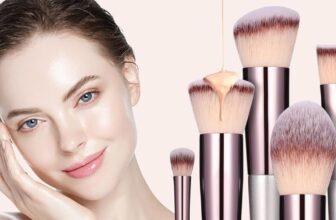Makeup can enhance beauty, but it often raises concerns about skin health. Many people wonder, is makeup bad for your skin?
Understanding how makeup affects your skin is important for everyone. Some products can clog pores or cause irritation. Others may contain chemicals that harm your skin over time. With so many options available, it’s easy to feel confused. Some makeup can be beneficial and even nourishing.
It’s key to know which products to choose. This guide explores the effects of makeup on your skin. We will look at different types of makeup and their potential impact. By the end, you will have a clearer picture of how to care for your skin while enjoying makeup.
The Skin And Makeup Connection
The skin has many important jobs. It protects our body. It keeps moisture in and germs out. Healthy skin looks good and feels good. Makeup can change how skin looks. It can cover spots and redness. Some makeup helps skin feel soft.
Choosing the right products is key. Natural makeup is often better. It usually has fewer chemicals. Check labels for safe ingredients. Removing makeup at night is very important. Dirt and makeup can cause breakouts. Always wash your face before bed.
Skin can be sensitive. Some people have allergies to makeup. Watch for rashes or irritation. If skin feels bad, stop using that product. Keeping skin healthy should be the main goal.

Credit: m.youtube.com
Common Makeup Myths
Many people think makeup clogs pores. This is a common myth. Not all makeup does this. Some products are non-comedogenic. They do not block pores.
Another worry is that makeup speeds up aging. This is also not true. The right makeup can even help protect skin. Good makeup can have benefits like hydration.
Using quality products is important. Always remove makeup before sleeping. This helps keep skin healthy and fresh. Choose the right products for your skin type.
Ingredients To Watch Out For
Many makeup products contain comedogenic substances. These ingredients can block pores. This may cause acne and other skin problems. Common comedogenic ingredients include:
- Coconut oil
- Lanolin
- Petrolatum
- Sodium Lauryl Sulfate
Be careful with harmful chemicals in cosmetics. Some can irritate skin. Others may lead to allergies. Here are some to avoid:
| Chemical | Possible Effect |
|---|---|
| Parabens | Hormone disruption |
| Formaldehyde | Skin irritation |
| Fragrance | Allergic reactions |
Always check labels before buying makeup. Choose products with safe ingredients.

Credit: www.michaelshealth.com
Makeup And Acne: Is There A Link?
Makeup can affect your skin in many ways. Some people notice more breakouts. The type of makeup used matters a lot. Certain products can clog pores. This leads to acne and other skin issues.
Non-comedogenic products are better for your skin. They do not clog pores. Look for labels that say “non-comedogenic.” These products help reduce breakouts. Always check ingredients before buying.
Keep your skin clean before applying makeup. Remove makeup properly at night. This helps keep skin healthy and clear. Your skin needs to breathe.
The Impact Of Makeup On Sensitive Skin
Makeup can affect sensitive skin in many ways. Identifying irritants is important. Some common irritants are fragrances, alcohol, and certain colors. These can cause redness, itching, or breakouts. Always check the ingredients list on products.
Choosing the right products is key. Look for hypoallergenic and non-comedogenic labels. These products are less likely to cause problems. Mineral makeup is often a safer choice. It has fewer irritating ingredients. Always do a patch test before using new products.
Benefits Of Makeup Beyond Aesthetics
Makeup can do more than just enhance beauty. Some products have skin care benefits. They can help keep skin moisturized and protected. Certain makeup contains SPF. This helps shield the skin from harmful UV rays.
Some foundations and tinted moisturizers also have antioxidants. These can fight free radicals. Free radicals can cause skin damage. Many makeup brands include natural ingredients. These ingredients may help nourish the skin.
Using makeup with protective qualities can be smart. It can help improve skin health while looking good. Choosing the right products can make a big difference.
Proper Makeup Application And Removal
Applying makeup can be fun and creative. Choose skin-friendly products. Check the ingredients. Avoid heavy or oily makeup. Use light layers for a natural look. This helps your skin breathe.
Always start with a clean face. Apply a good moisturizer before makeup. This keeps your skin hydrated. Use clean brushes and tools. This prevents dirt and germs on your skin.
After the day ends, remove all makeup. Use a gentle makeup remover. Follow with a good cleanser. This helps to keep your skin clear and healthy.

Credit: www.livethatglow.com
Natural And Organic Makeup Alternatives
Natural and organic makeup offers many benefits. They can be safer for your skin. These products often have fewer chemicals. Many people report less irritation. They also may help with sensitive skin.
Yet, there are some downsides. Natural makeup may not last as long. It can be more expensive than regular products. Some people might not like the texture. Finding the right shade can be tricky.
| Brand | Product |
|---|---|
| 100% Pure | Fruit Pigmented Foundation |
| RMS Beauty | Uncover Up Concealer |
| Ilia Beauty | Tinted Lip Conditioner |
| Alima Pure | Foundation Powder |
Expert Opinions And Clinical Studies
Many dermatologists have different views on makeup use. Some say it can cause skin issues. Others believe it is safe if used correctly.
Research shows that long-term makeup use can lead to problems. These can include acne, irritation, and dryness. Choosing the right products is key.
Some makeup contains harmful ingredients. Always check labels for parabens and fragrances. These can irritate sensitive skin.
Regularly removing makeup is very important. Not removing it can lead to clogged pores. This can cause breakouts and other skin problems.
Creating A Skin-friendly Makeup Routine
Healthy skin is important for everyone. A good makeup routine helps. Start by choosing gentle products. Look for makeup that is non-comedogenic. This means it won’t block pores. Always wash your face at night. Removing makeup is key for skin health.
Use moisturizer before makeup. This keeps skin hydrated. A good sunscreen protects skin from damage. Make sure to drink water daily. Water helps to keep skin fresh. Eating fruits and veggies also helps skin stay healthy.
Limit makeup use on some days. Let your skin breathe. Choose light makeup for casual days. Focus on skin care above all. Taking care of your skin is the best makeup.
Frequently Asked Questions
Is Wearing Makeup Harmful For Your Skin?
Wearing makeup can be harmful if not removed properly. Clogged pores can lead to breakouts and irritation. Additionally, certain ingredients in makeup may cause allergic reactions or skin sensitivity. It’s essential to choose quality products and maintain a consistent skincare routine to mitigate potential damage.
Can Makeup Cause Acne Breakouts?
Yes, makeup can cause acne breakouts, especially if it’s not non-comedogenic. Heavy or oil-based products can clog pores, trapping dirt and bacteria. It’s important to cleanse your face thoroughly at the end of the day. Consider using products formulated for acne-prone skin to help reduce breakouts.
How Can I Protect My Skin From Makeup?
To protect your skin from makeup, always start with a good primer and moisturizer. Choose non-comedogenic and hypoallergenic products to minimize irritation. Regularly cleanse your skin to remove makeup residue. Lastly, give your skin makeup-free days to breathe and rejuvenate.
Does Makeup Age Your Skin?
Makeup itself doesn’t age your skin, but improper use can contribute to premature aging. Heavy products can settle into fine lines, making them more noticeable. Additionally, failing to remove makeup at night can lead to skin damage over time. Prioritize skincare to maintain youthful skin.
Conclusion
Makeup can affect your skin in different ways. Some products may cause irritation or breakouts. Choosing the right makeup is important. Always look for non-comedogenic and hypoallergenic options. Clean your face well at the end of the day. Giving your skin a break helps, too.
Pay attention to how your skin reacts. Healthy skin is beautiful skin. Make informed choices about makeup. Your skin will thank you for it.







